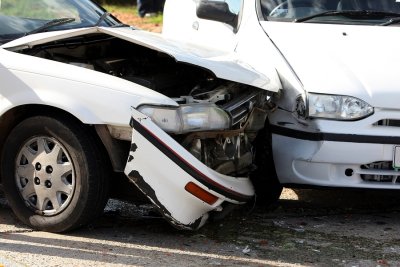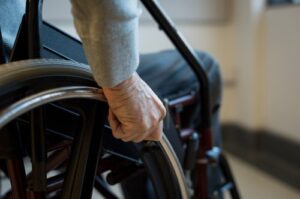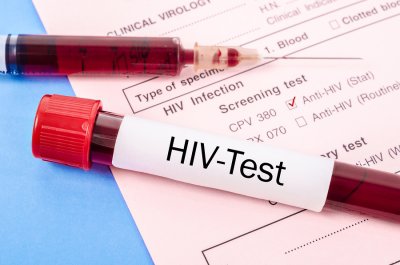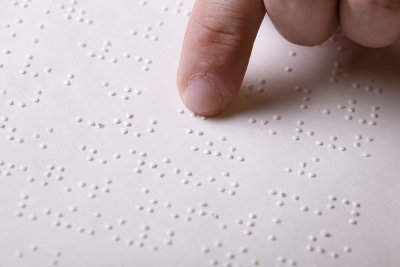-
Permanent Partial Disability and COVID-19 Part II
In Part I of this blog post, I gave a basic overview of permanent partial disability (PPD) benefits. So what kind of permanent partial disability benefits might someone who gets infected with COVID-19 at work expect to receive? Permanent partial disability benefits usually involve lasting physical effects. I found at least one news article describing COVID-19 as having possible permanent respiratory effects (such as permanent lung scarring or fibrosis), as well as possible lasting cognitive effects, although there is not yet enough data to reach definite conclusions.[1] There is also a discussion of COVID-19 causing issues with blood clotting, stroke, and heart problems.[2]
Let’s say that an injured worker (Izzy) suffers lung fibrosis as a result of work-related COVID 19. The lungs are considered part of the “body” for PPD purposes. An injury to the body allows someone to receive a maximum of up to 500 weeks of PPD payments. Izzy goes to one independent medical evaluation and that doctor says he’s suffered a 20% permanent impairment of his respiratory function as a result of COVID 19. The insurance company sends Izzy to their independent medical evaluator, and that doctor rates him as 10% permanently injured.
At this point, Izzy would likely go to a hearing[3] and a Workers’ Compensation Commissioner would review both physician reports as well as listen to Izzy testify about what symptoms he’s still having, such as difficulty breathing or pain in his chest. At that point, the Commissioner would assign a percentage of permanent impairment to Izzy’s lungs. That number is very important. In the Workers’ Compensation system, we speak of different “tiers” of payments. If someone is awarded less than 75 weeks of payments, they receive payment at the Tier one rate, which is 1/3 of their average weekly wage up to a statutory maximum. If the person receives 75 weeks or more of payments, they receive the higher Tier two payment rate, which equals 2/3 of their average weekly wage, up to a statutory maximum. The difference between receiving a Tier one rating vs. a Tier two rating means thousands of dollars for an injured worker.
In Izzy’s case, he wants to get an award of at least 15% from the Commissioner, because of 15% of a maximum possible of 500 weeks = 75 weeks. A 15% rating or above will get him the Tier two rate. Any rating lower than 15% will get him the Tier one rating. Much rides on the ratings of the different doctors as well as how Izzy communicates his symptoms to the Commissioner.
Physical effects are not the only ones that may be relevant. Workers’ Compensation in Maryland also at times allows someone to be compensated for psychological harm incurred as a result of an incident at work.
I think it’s important to keep in mind that there are two classes of individuals who may claim psychological harm as a result of COVID-19: those who actually become infected with the disease, and those who have to work in the incredibly difficult circumstances of healthcare clinics with high rates of the disease.
As to the first group of individuals, those who actually become infected with COVID-19: the Courts in Maryland do recognize psychological harm as something that can arise out an “accidental personal injury” that one suffers at work. Belcher v. T. Rowe Price, 329 Md. 709 (1993) is a case in which Maryland’s highest courts examined the concept of psychological harm in the workers’ compensation cases. In that case, the claimant was at work when a huge construction beam came crashing through the roof. Although she was not physically harmed, she suffered psychological detriments. This is what the Courts deem a “mental-mental” situation: a mental stimulus (the fear of the crashing beam) induces “mental” suffering. The Court held that claimants could seek Workers’ Compensation benefits for psychological injuries, as long as the mental harms were induced by a “sudden or violent” event, and that the psychological harms were capable of objective determination.
COVID-19 is a bit different, in that the anxiety an infected person suffers is not a “mental-mental” event, but rather a “physical-mental” event: a “physical” cause (infection of one’s body with a disease” provokes possible “mental” effects (anxiety, depression, etc.) It remains to be seen whether the Commission and Courts will apply the same standard of requiring a “sudden and violent” accident to induce the psychological harms, or whether perhaps the law will be more lenient in the case of COVID-19, where definite physical harm is suffered.
The second class of workers who may be entitled to benefits are healthcare workers who perhaps were not infected themselves, but had to show up to work day in and day out during the pandemic and deal with the incredibly difficult scenario of treating COVID 19 patients and perhaps watching many of those patients lose their lives in a very painful way. The Court of Appeals has recognized that post-traumatic stress disorder (PTSD) can be a compensable “occupational disease” for workers’ compensation purposes in certain situations. The key case is Means v. Baltimore County, 344 Md. 661 (1997). That case involved a paramedic who through the course of her work was exposed to several “gruesome” accident scenes and eventually developed PTSD as a result. The Court held that PTSD may be a compensable occupational disease if: 1) the employment is of such a nature that the risk of PTSD is a hazard of that particular employment, and 2) the PTSD is contracted as the result of an in the course of employment and causes the employee to become incapacitated.
There’s certainly an argument to be made that healthcare workers who develop PTSD based on what they experienced through the pandemic may have a valid occupational disease claim. One hurdle is that, traditionally, the occupational disease must develop in a “slow and insidious” manner. The pandemic has only lasted a few months so far, and it’s unclear how long it will go on for. It may not last for a long enough time to allow for “slow and insidious” development of PTSD, although that may be an issue that needs to be litigated.
Please call us at 410 787 0022 to discuss work-related COVID-19 or any other question you may have about workers’ compensation in Maryland.
- 1. George Citroner. What We Know About The Long-Term Effects of Covid-19. Healthline. April 21, 2020. https://www.healthline.com/health/coronavirus-covid-19
- 2. Mark Terry. Unexpected Cause of Death in Younger Covid-19 Patients is Related to Blood Clotting. Biospace. April 28, 2020. https://www.biospace.com/article/covid-19-increases-risk-of-heart-attacks-and-stroke/
- 3. However, it’s also possible that his case would be settled without having to go to a hearing
““
-
Permanent Partial Disability (PPD) Benefits and COVID-19, Part I: An Introduction to PPD
When someone in Maryland is injured on the job, the Workers’ Compensation statute allows that person to receive certain benefits. Those benefits include Temporary Total Disability (TTD) payments, which provide for two-thirds of the person’s average weekly wage during the time the person is totally unable to work due to the work accident. Another class of benefits is the payment of all causally-related medical costs by the employer or workers’ compensation insurer.
When someone in Maryland is injured on the job, the Workers’ Compensation statute allows that person to receive certain benefits. Those benefits include Temporary Total Disability (TTD) payments, which provide for two-thirds of the person’s average weekly wage during the time the person is totally unable to work due to the work accident. Another class of benefits is the payment of all causally-related medical costs by the employer or workers’ compensation insurer. The third class of benefits is what is referred to as Permanent Partial Disability (PPD) benefits. Oftentimes when someone is hurt, they will go through a course of treatment, which could include surgery, therapy, medications, or whatever other medical treatments are necessary to restore them to good health. However, many times, even after the person has gone through treatment and achieved what is known as Maximum Medical Improvement (MMI), the person will still experience some degree of lingering symptoms or issues as a result of the work accident. PPD benefits are designed to compensate for those.
A typical example would be someone who breaks a bone in their hand while at work. Let’s say that person undergoes surgery and the course of occupational therapy which allows them to get back to work after six months. However, the person still experiences ongoing numbness, tingling, weakness, and/or loss of range of motion in the affected hand. Most likely the person will always have some degree of lasting effects due to the injury.
At this stage, the person should be “rated” for their level of permanent impairment. Usually, at least two doctors will rate a workers’ compensation claimant as to the degree of personal injury: one physician that is contracted by the injured worker or his/her attorney, and one physician by the employer/insurer’s physician. Not surprisingly, the claimant’s doctor will usually provide a higher disability rating than the employer/insurer physician. After that, the two sides will either work out a settlement agreement as to the level of permanent damage, or they will go to a hearing in which a Workers’ Compensation Commissioner will review the medical reports and hear the testimony of the worker as to what ongoing issues are still being experienced. Then the Commissioner will assign a rating to the person’s permanent injuries.
Each body part in Maryland is assigned a different total number of weeks of permanent partial disability benefits. For example, to use our imaginary situation of an injured hand, the maximum number of weeks of permanent partial disability that someone can receive for a hand is 250 weeks of payments. Now let’s say that our injured worker goes to a hearing, and the Commissioner decided that he has suffered a 10% permanent loss of use of his hand due to the work accident. To figure out how much money the person would receive, we would multiply 10% x 250 possible weeks x one-third of the person’s average weekly wage. In 2019, the maximum weekly payment that someone could receive for a 10% hand injury would be $187.00/week.
10% x 250 weeks x $187.00 = $4,675.00 in payments paid over the course of twenty-five weeks.
I hope that example was not too complicated. To summarize, there are several factors that come into play when determining PPD: what part(s) of the body were injured; how badly injured they were, based on independent medical evaluations; and what the person’s average weekly wage was at the time of the injury. How does this apply to COVID-19? I will address that in Part II.
““
-
How Does Another Driver’s DUI Impact Your Accident Claim?
Car accidents occur around the Baltimore area every day. Unfortunately, many of them are caused by reckless drunk drivers who jeopardize the safety of everyone else on the road because of their irresponsible decisions. If you survived a car accident caused by a drunk driver, you should consult an injury lawyer right away. You shouldn’t have to pay for damage inflicted by someone else. Any claim or lawsuit that your injury lawyer files on your behalf will proceed entirely separately from criminal charges against the other driver.

Negotiating a Just Settlement
Drunk drivers cost their insurance carriers big bucks. Because insurance companies know that juries almost always find in favor of the plaintiff in these cases, these companies are usually quite willing to settle the case. However, the insurance carrier’s idea and your idea of a just settlement may be fairly disparate. It can take some back-and-forth negotiations between your injury lawyer and the insurance company to reach a fair settlement. Remember to keep your lawyer updated with any changes in your health status. If you require additional surgery, are diagnosed with another medical problem, or otherwise experience a change in your health, this will affect the settlement negotiations.
Deciding to Take a Settlement
Your lawyer can offer advice on whether or not a settlement offer is fair in light of your losses. However, only you can decide whether to agree to settle the case or not. There’s no need to rush to a decision. If you do agree to the settlement, you cannot later change your mind. However, you could decline the settlement and then reconsider a settlement at a later date, assuming that the other party is still willing to settle.
Going to Trial
If a fair settlement offer is not forthcoming, it’s time to talk to your lawyer about the merits of taking the case to trial. In civil lawsuits, drunk drivers are nearly always held liable for the damages they inflict. However, you will have to be prepared to testify and have your medical records scrutinized. Your lawyer will guide you through each step of the litigation process.
-
What Is Occupational Asthma?
Asthma is a chronic, inflammatory condition that affects the airways and causes trouble breathing. Periodically, the inflammation can become significantly worse in a flare-up called an asthma attack. There are different types of asthma, including occupational asthma, which is a disease triggered by a workplace. If your doctor informs you that you have asthma and you suspect your job may be to blame, talk to a workers’ comp attorney in Baltimore right away. Under workers’ comp law , your medical treatment may be covered and you may be entitled to receive additional benefits.
Your workers’ comp lawyer may ask to see your medical records, which might indicate whether you have work-aggravated asthma or true occupational asthma. Work-aggravated asthma refers to pre-existing asthma that is worsened by conditions in the workplace. True occupational asthma originates directly from the workplace. Jobs that require exposure to chemical irritants or sawdust, for example, can irritate the airways. A workers’ comp lawyer can make sure your employer follows all the necessary steps to protect employees, such as implementing a health surveillance program and establishing effective irritant control measures.

-
FAQs and Answers About Maryland’s DUI-Related AEP Requirements
Maryland’s Alcohol Education Program, or AEP, is a rehabilitation initiative for people who have been convicted of DUI or DWI. If your attorney in Baltimore advises you to attend one of these programs as a result of your court case, here is a look at what you need to know.

What exactly is the AEP?
Maryland’s AEP is a 12-hour class designed to educate people about alcohol use and abuse as well as the risk of driving while intoxicated. It is frequently required for people who have been convicted of DUI or DWI before they can regain their licenses. In some cases, a 12-hour AEP program is recommended by the court in lieu of jail time or other penalties, especially for a first offense. If the court has identified you as an alcohol abuse or alcohol dependent, you may be required to take a longer program than the 12-hour AEP.
What are some reasons I may need to take the AEP?
You could be referred to the AEP on the recommendation of a district court judge or by an administrative law judge from the Office of Administrative Hearings. If your license was revoked because of an alcohol-related offense, you will be referred to the AEP when you apply to have your license reinstated. Your lawyer may request that you be referred to the AEP as well to reduce some of the other potential punishments associated with your DUI or DWI conviction.
What are the consequences of not attending the AEP?
When you are referred to the AEP, you must begin the class within 90 days of your referral. If you do not, then you will receive a letter telling you that you are required to surrender your license to an MVA location. You will need to complete the course before you can get your license back. If you were instructed to attend the AEP in lieu of another punishment, the court may enforce that punishment instead.
If you are in need of a DUI defense attorney, contact Jack J. Schmerling Attorney at Law today!
-
How Long Will My Disability Benefits Last?
Once your lawyer in Baltimore helps you secure your disability benefits , you should continue to receive them for as long as you meet the eligibility criteria. There are a few things that can cause your benefits to be terminated. First, know that while on disability, you’re responsible for promptly reporting whether your medical condition improves or whether you return to work. If your health improves to the point at which the Social Security Administration (SSA) no longer considers you to be disabled, then your benefits will be terminated. The SSA will periodically review your case to assess whether you are still disabled.
It’s possible to return to work without automatically forfeiting your disability benefits. The SSA refers to this as a “work incentive.” It’s designed to encourage benefit recipients to test their ability to work, while still having the safety net of benefits. If you are able to return to a level of work that gives you substantial earnings, then you’ll no longer receive benefits. How the SSA defines “substantial earnings” is subject to change over time—you can consult your lawyer about the current regulations.

-
Can I File a Wrongful Death Claim After Someone Runs Over My Dog?
Pets are regarded as property in the eyes of the law. For years, pet parents have been distressed to find that their options for legal recourse do not sufficiently reflect the significant, long-lasting emotional trauma of losing a pet to someone else’s negligence. Some states have slowly begun to change this approach, including Maryland. If you live in Baltimore, you can talk to an accident attorney to find out if you could file a lawsuit against the person who caused the car accident that killed your dog.

Consulting an Injury Lawyer
The sudden loss of a beloved member of the family can interfere with your clarity of thought. As difficult as it is to discuss the event, you do need to see a lawyer promptly. He or she will review your case and evaluate the value of the claim. Depending on the circumstances, you may wish to settle the case out of court. Your attorney can contact the negligent driver or the insurance carrier to explain the monetary value of your loss, and offer to settle the case instead of filing a lawsuit. If compensation isn’t forthcoming, you can take legal action.
Filing a Lawsuit
You can only sue for wrongful death if a human was killed. However, you can still file a civil lawsuit against the person who killed your pet. Your lawyer will present evidence to prove that the defendant’s negligence directly caused the car accident that killed your dog. Once the defendant is served with the paperwork, it’s quite possible that he or she will be more willing to settle the case out of court.
Assessing Damages
A key component of any lawsuit is the assessment of damages. In many jurisdictions, dog owners are limited in the amount of compensation they can recover. A court will typically award the amount the dog would cost, plus related veterinary bills. The following factors may play a role in determining the dog’s value.
- Purchase price
- Breed
- Training
- Age
- Health (prior to the car accident)
- Special characteristics of value
- Usefulness
If the dog was a champion show dog, a service dog, or specially trained law enforcement dog, the value would increase. Recently, Maryland courts have ruled in favor of allowing bereaved puppy parents to secure compensation for their emotional distress. Claims of mental anguish can be substantiated by records that show you sought mental health counseling in the wake of the death.
-
Does HIV/AIDS Qualify for Social Security Disability Payments?
Human immunodeficiency virus (HIV) is a chronic, incurable disease that attacks the immune system. This leaves patients vulnerable to other serious infections and diseases. Acquired immunodeficiency syndrome (AIDS) is the end stage of HIV infection. Because HIV can take years to progress, patients might not qualify for Social Security disability benefits for a while. A lawyer in Baltimore who handles Social Security disability claims can provide personalized guidance based on the factors that are unique to each case.

When HIV/AIDS Qualifies for Disability Benefits
The primary infection results in acute, flu-like symptoms that typically last no longer than a few weeks. After this point, the patient enters the clinical latent infection stage, also known as chronic HIV. If the patient does not take HIV medications, the stage may last 10 years before progressing to AIDS. With medications, it may take a few decades before reaching the end-stage. During the chronic HIV stage, patients often experience few to no symptoms. This means they might not be classified as disabled. To qualify for Social Security disability benefits before HIV progresses to AIDS, patients must prove that they have one or more “opportunistic” illnesses that arise as a result of the suppressed immune system.
How to Prove Disability
HIV/AIDS patients must first prove that they were diagnosed with HIV/AIDS. This is easily accomplished via medical records. The next step is more complex. It involves sorting through the Social Security Administration’s “blue book,” or listing of official disability requirements. Patients would be well advised to consult a lawyer about these requirements before filing a claim. Here’s a brief, incomplete overview of the requirements:
- Bacterial infection, including multiple infections that required hospitalization
- Viral infection, including treatment-resistant shingles
- Fungal infection, including pneumonia caused by Pneumocystis fungi
- Protozoan or helminthic infection, including toxoplasmosis
- Cancer
- Skin or mucous membrane condition, including treatment-resistant lesions
- HIV encephalopathy with brain swelling that causes cognitive/physical impairment
- HIV wasting syndrome, with a loss of 10% or more bodyweight
- Diarrhea that requires intravenous hydration
Other illnesses can qualify. Consult a lawyer for further guidance.
How to Qualify Based on Limited Functional Capacity
Even if patients do not qualify under the disability listing, they may qualify for benefits based on their limited functional capacity. A residual functional capacity (RFC) rating determines whether a person can perform sedentary, light, or medium work. The SSA will probably consider a person disabled if he or she lacks job skills and higher education, and can only perform sedentary work.
-
Qualifying for Disability with Low Vision or Blindness
If you are living with low vision or blindness, you could qualify for Social Security disability benefits. However, the qualification requirements are strict and the procedure is lengthy, so it is helpful to have an experienced attorney in Baltimore to assist during the approval process. Here is what you need to know about applying for disability benefits for low vision or blindness.

How does the Social Security Administration define blindness?
In order to be considered blind under Social Security guidelines, you must not be able to correct your vision to better than 20/200 in your better eye for a period of at least 12 months or a period that is expected to last for at least 12 months. Alternatively, you can have a visual field of 20 degrees or less in your better for the same time period. If your vision doesn’t meet the definition of blindness but you have low vision that prevents you from working either alone or in conjunction with other health issues, then you still may be eligible for benefits.
What kind of disability benefits can I receive?
Two disability programs may provide benefits when you’re blind or have low vision: Social Security Disability Insurance (SSDI) and Supplemental Security Income (SSI). SSDI is based on credits earned while working, so you are only eligible for it if you have ever had a job, or in some cases, based on your parents’ or spouse’s earnings. SSI is not based on past employment, so you are eligible for these benefits even if you don’t have any work history.
How do I apply for benefits?
Although you can apply for benefits by contacting the Social Security Administration on your own, having a lawyer guide you through the process is recommended. Many people are rejected for benefits on their first try, and having an attorney can help you avoid an initial rejection and the need to appeal. An experienced attorney knows how to avoid application errors and build your case effectively.
-
Common Questions About Insurance and DUI Convictions
Getting arrested on suspicion of drunk driving is a serious matter. A DUI conviction can lead to many more problems than simply a fine and some time behind bars. If you’re convicted, you could face long-term consequences, including higher insurance rates and problems finding a job due to your criminal record. It’s in your best interests to get in touch with a DUI lawyer in Baltimore as quickly as possible. Remember not to answer any of the police officers’ questions about your alcohol use until you speak with a lawyer.

What insurance problems may occur after a DUI conviction?
It’s common sense that your motor vehicle insurance premiums would increase considerably after a DUI conviction. After all, drunk drivers are often repeat offenders, and having this type of criminal history substantially increases the risk of a major car wreck. Some people convicted of DUI find that their current auto insurance carrier refuses to renew the policy, forcing them to look elsewhere for a company that will accept a questionable driving history. But beyond auto insurance, DUI convictions can have an impact on other insurance policies, such as life insurance. After a DUI conviction, you may have a hard time finding a life insurance carrier that will insure you. If you do, you can expect to pay high premiums.
Why do life insurance companies care about my criminal record?
Life insurance companies care about your DUI conviction because it speaks to your overall health and safety. They know that drunk drivers are likely to be repeat offenders, which means there is a possibility that you will die in an alcohol-related crash before a term life policy expires. Drunk drivers are also considered to be risk-takers who may be more likely than the average person to engage in other dangerous behaviors. Furthermore, convicted drunk drivers are more likely than the average person to have existing health problems that may shorten life expectancy, such as cirrhosis or liver cancer.
What about life insurance policies that don’t require a medical exam?
Many convicted drunk drivers assume that life insurance policies that do not require a medical exam will extend coverage at a reasonable premium. However, even if a carrier doesn’t require an exam, it will still check your DMV record.
RECENT POSTS
categories
- Uncategorized
- Worker's Compensation
- Attorney Fees
- Auto Accident Injury Whiplash
- Attorney Review
- Personal Injury
- Social Security Disability
- DUI
- Workplace Injuries
- Auto Accident
- Workers Compensation Claims
- Permanent Disability
- Infographic
- Drunk Driving
- Wrongful Death
- Works in Maryland
- Uninsured Motorists
- Motorcycle Crashes
